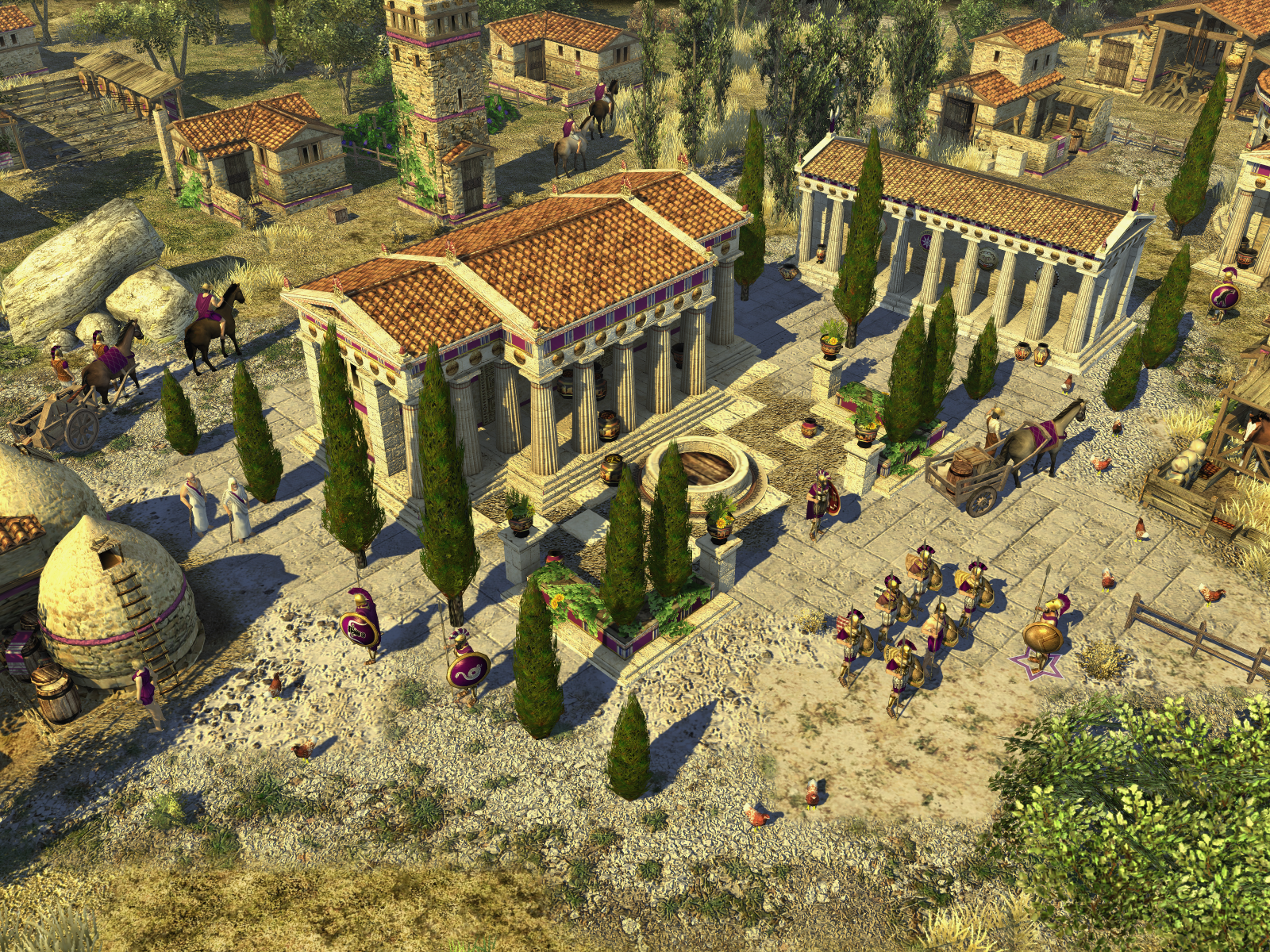-
Posts
2.760 -
Joined
-
Last visited
-
Days Won
146
Everything posted by Itms
-
The third Release Candidates are available for Alpha 27 You will find them at https://releases.wildfiregames.com/rc/ with the -rc3- infix. They contain fixes for the issues mentioned above. Please test this version today as much as possible, as we aim to release tomorrow (Thursday) morning (European hours). Thanks again for your help!
-
Marian Legionary animation Crash in lobby dialog Nouveau driver issue with GPU Skinning with OpenGL are all fixed in the release branch and the latest nightly build. We are going to fix the ARB crash reported below before publishing the RC3 with those fixes. Please continue testing the RC2! All those last minutes bugs could have been detected using the nightly build, as advertised in the top post of this thread one month ago. Please do not wait for the upcoming/latest build to extensively test. Thanks for your help
-
We are also going to fix tonight, which will require a rebuild, so the RC3 will be out during the night or tomorrow morning as early as possible (European hours).
-
Thanks for the report I have a fix. Can you test applying this: https://gitea.wildfiregames.com/0ad/0ad/commit/6ac5c376eab55e59b831605e1b2a01ec03f8dfa8 to a nightly build? We'll generate RC3 this afternoon, including this fix, and a fix for the animation of the Marian Legionary. The game will not be rebuilt for that, so there will be no need for extended testing.
-
Building the RC only concerns Linux users though. There is a slight learning curve to overcome to learn how to build software from source on Linux, but 0ad is not very different from other software in that regard. It's just never easy to build your first program when you're just a regular user
-
Everything is ready for release. We wish to let players test the RC2 as long as possible. Since a testers match is planned for tomorrow, we'll wait for this competition to assert no breaking bugs were found.
-
Thanks for the reports, I have opened an issue for those and others you may find. However this is not fixable for A27, as that would need re-translating them. This release has been in preparation for two years, with the last two months fully dedicated to the release process. We don't have the same definition of "rushed" it seems
-
Hi folks, the second RC for A27 is out. Thanks for testing the RC1. At this point we are not going to include balance changes in A27, we are only fixing breaking bugs. There is a chance that we release this weekend if no big bugs are found, so the timing for your testing weekend might not be the best. We could wait for after the weekend in case your match session allows us to detect breaking bugs, but it would be better if you could start testing as much as possible. If issues are found in the next days we'll do our absolute best to have a RC3 ready for testing on Sunday.
-
The second Release Candidates are available for Alpha 27 You will find them at https://releases.wildfiregames.com/rc/ with the -rc2- infix. Thanks for testing!
-
@Darkcity Thanks for the report! Can you attach the replay for this game? When you browse the replays in-game, the path where they are located is displayed. On Windows, the folder is in Documents\My Games\0ad\replays\0.27.0
-
They're at the tip of the branch, 173100c5c3. The RCs are based on the nightly build.
-
The Unix bundles are used by package maintainers, they still need to be compiled following the Build Instructions. You'll need unix-build to build the game and then unix-data to play it.
-
The first Release Candidates are available for Alpha 27 You will find them at https://releases.wildfiregames.com/rc/ Please report any issues in this thread! We are preparing the announcements, hoping to deliver this new release soon if no breaking bugs are found. Thank you to everyone who has already tested and provided feedback on the mock bundles.
- 53 replies
-
- 10
-

-

-

Revision Log not updated on 0AD Homepage
Itms replied to Grautvornix's topic in Game Development & Technical Discussion
This is now fixed! -
I edited the previous post: the Mock Release Bundles are now signed on macOS, and should not require workarounds to be tested. Thanks to everyone who gave feedback and reported bugs already! We are steadily progressing towards the first RCs.
-
Hello everyone! We are now in Feature Freeze for A27. With the new git workflow, a few things have changed (improved, we hope). The nightly-build tracks the state of A27 and can be used to test the new version. It is generated daily, and you can get it using SVN. Detailed information can be found on the wiki if you try to build the game on Unix, please note that the build process has slightly changed. you need to run first libraries/build-source-libs.sh, then build/workspaces/update-workspaces.sh, then make as usual Mock Release Bundles are also generated daily, from the nightly build. They can be downloaded from our Jenkins build system. Future RCs will be taken directly from here. For now, we have a few bugs to fix, you can find them on the Alpha 27 Milestone of our bugtracker. A higher overview of the release process can be found at [RELEASE PROCESS] Alpha 27 Contrary to previous releases, we are able to use a git branch for preparing the release. Thus, the contribution workflow is not stalled during the process. We are still merging the work of devs and contributors into the repository, for inclusion in the future releases. The preparation of Alpha 27 is made in parallel, and not blocking. That said, most of our energy is dedicated to the release, and you will experience delays in us reviewing contributions. Please make sure no mods are enabled when testing the game. Note that the "spirv" mod for Vulkan shaders is obsolete. The nightly build and bundles already contain the shaders. You can delete all trace of this spirv mod from your computers. It will not be needed anymore. What should I test? Everything What should I report? Not everything. We must fix regressions (stuff that used to work, but doesn't work anymore) and critical issues that would prevent the users from playing. We cannot reasonably fix all the existing bugs in the release. Critical issues include crashes and multiplayer OOS. How to report them is detailed in the ReportingErrors wiki page. With the new daily generation of testable game versions, it is absolutely necessary to check you use the same nightly build (version is displayed in the main menu) without any mods when testing for OOS. Happy testing!
- 53 replies
-
- 17
-

-

-

How-To download and checkout 0 A.D. SVN on Windows
Itms replied to nebkas's topic in General Discussion
Done -

svn update, Building SpiderMonkey – failed, rust too old
Itms replied to zyli's topic in Bug reports
Hi, thanks 2. would be fixed by 7. but you're right, that doesn't work in the nightly SVN. Instead, if you version of subversion is recent enough, "svn cleanup --remove-unversioned" would do the trick. 5. 6. ah, you're correct. those are fixes that are in place in our CI configuration, but on on the build instructions. 9. The SPIR-V mod is not needed anymore, you can delete it from everywhere. All the SPIR-V shaders are already included in the nightly build. -

On the usage of AI to generate 0 A.D. content
Itms replied to wowgetoffyourcellphone's topic in Official tasks
and the vast amount of underpaid workers from developing countries -

On the usage of AI to generate 0 A.D. content
Itms replied to wowgetoffyourcellphone's topic in Official tasks
I'm not an artist but I'm amazed by what they can create and very proud of participating to a project that is so visually appealing. I would be very sad to see this work from humans replaced by generated contents copied over from someone else's work (because "generative" AI creates from plagiarized content, for now). Jason, the content you sent is beautiful, but knowing that no one spent time on it, demonstrating their skills through it, removes all the value in my eyes. I'm on 0 A.D. to do something selfless, spend much time on something for the love of it. The end result is not by far my main metric of satisfaction. Similarly, genAI could generate documentation and increase our metrics on this front... but without real added value. If an AI can deduce what the code does, maybe documentation was not absolutely necessary at this place. Worse, it can generate low-quality comments which mask the need for detailed information written by competent developers. And, my main concern, regardless of the very personal input I'm giving above, is the carbon footprint of these tools, which is ridiculous. If we're accelerating the catastrophe just to splash shiny images on a hobbyist game, we're being very careless. That also includes using genAI for inspiration. -

Alpha 27 Pre-release/Release Candidate Build Testing
Itms replied to Stan`'s topic in Game Development & Technical Discussion
As long as it's still relevant maybe it would be good to test and have reproduction steps on the nightly build. -

svn update, Building SpiderMonkey – failed, rust too old
Itms replied to zyli's topic in Bug reports
Hello zyli, thanks for the report and the useful feedback on the build system. This is currently being fixed, in PR-7323 Unfortunately, Rust 1.66 is a requirement from Mozilla to build SpiderMonkey, we cannot decrease that. However, you can install Rust 1.66 or later using Rustup instead of your package manager. This is the recommended Rust install method. On our CI this allows us to build and test 0 A.D. even on Debian Bullseye. -

Default unit behavior: capture or destroy?
Itms replied to Gurken Khan's topic in Gameplay Discussion
I don't care much, but from the (very) few games I played with this new system, I feel like it's closer to a traditional RTS experience while still retaining that realistic and original feature of capturing, which allows players to diversify their strategy and turn a game around. I quite like it. I am not sure it's possible to reach a consensus here on the forums, but what about trying a release with that change, and see how the wider community reacts? It's always time to switch that back in the community mod and A28... -

Alpha 27 Pre-release/Release Candidate Build Testing
Itms replied to Stan`'s topic in Game Development & Technical Discussion
It does not look like it, the missing files are not LFS files. Moreover the user reports using the nightly build, so there is no need to pull anything. @superserioussam I think that your download of the nightly build is incomplete. In the nightly build folder, right click somewhere and choose "SVN Update". If you get error messages, try a cleanup first: "right click > TortoiseSVN > Clean up...", then check all the boxes, let it finish, then retry "SVN Update". The update process should complete with the message "Completed - At revision: 84" (or a higher number than 84 if you try this in the upcoming days)

